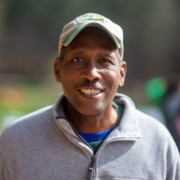Kigwana Cherry
Kigwana Cherry has been growing vegetables with his family since he was a child. Eight years ago, he began to develop an urban farm at his home in Augusta, Georgia. His back yard includes roughly ¼ acre of production space where he raises chickens and grows crops in raised beds. He practices what is referred to as square foot gardening, which is intended to maximize the potential yield of a given area. As a part of his intensive management of the property, he also innovates in various ways, like designing and building a terraced bed system to compensate for the slope of the property, he upcycles and uses things like pallet wood to build farm structures. He also uses renewable materials like bamboo to build some of his farm infrastructure, and he plans to harvest rainwater for his crops. Kigwana recently obtained a license allowing him to sell perennial plants with the eventual goal of developing it into a nursery.
Together with his mother, who studied animal science, Kigwana began adding goats to the farm. In a happy coincidence, four of the five goats purchased were pregnant. Even though the baby goats require extra care and work, Kigwana and his mother have rolled with it and taken the project head on.
In his own farm operation, Kigwana has had some difficulty with marketing. Though, in recent months he has been featured in newspaper articles, which has helped greatly with sales. Through his involvement in the farming community and associated groups, the public has become increasingly aware of the work he is doing, which has led to more interest in his farm. When the COVID-19 pandemic began, Kigwana’s income from his previous occupations dropped, creating a greater focus on his farm and the associated community.
Feelings of not being entirely welcome in the place he lives is a sentiment felt by many others in his community, and it is at the root of Kigwana’s desire to build an agrihood where people with a shared vision and goals are welcome to live and work. The agrihood would be developed as a creative space where farmers and gardeners can rent space to produce food for themselves and the community. People would also be able to live there in tiny homes and use the space to come together for events. Current municipal land-use regulations are obstacles to Kigwana’s dream of creating an agrihood. He is at odds with the municipality’s reluctance to allow what he sees as a sensible and accessible alternative lifestyle choice. He plans to continue searching and, if necessary, creating a legal way to bring his vision to fruition.
In commenting on the challenges that farmers face when accessing and trying to apply for services and programs, Kigwana mentioned that there needs to be more outreach and access to information. The farmers who are ready to begin applying for certain benefits end up needing to wait due to the lack of awareness around things like farm tract numbers and recordkeeping. In reflecting on the nature of government resources, Kigwana suggests that the money and support offered to the farming community doesn’t seem to make it out to the farmers of color as much as it should. Kigwana believes that those best suited to distribute information and grant funds are already in the communities that need those resources; institutions just need to access and use them to help spread the word and access their trusted networks.
As a member of the farming community in his area, Kigwana is an active participant in several groups and has even blended another of his passions into his community-based farm work. He started a group called Farmer Musician, through which he applied for a grant that funded concerts on five local Black-owned urban farms. The Soul on Series succeeded in bringing together the community to learn about their local farms and share in the experience of building community through celebration.








![thumbnail_ed-hunt[1] Ed Hunt](https://attra.ncat.org/wp-content/uploads/2022/08/thumbnail_ed-hunt1-180x180.jpg)


